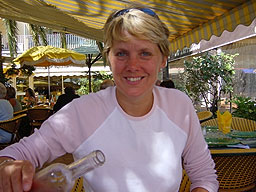The Newbie Session with Rebecca Mackinnon
Q: What kind of person blogs?
R: We are now going beyond the early adopters and into the mainstream. News Organisations are asking how to use blogs. So are schools. To date, this has been a culture of the tech savvy but tools and cultures are rolling into the broader population.
Dave McLure (ex Pay Pal) said that blogs used to be about just text and diaries. Now it’s about different media and how you can get folk started without making it too difficult technically.
Ed Cone – Greensboro, North Carolina - created a blog which is very much billed as ‘local’. ‘Journalists’ sprung up all over the place – politicians, locals etc. 60 functioning blogs in the county. His message is ‘encourage other people to blog’. To create blogs? Start one yourself. Encourage others to do it too. User blogger tools like Blogger or Radio. ( Most folk start on Blogger.
Discussion around the misuse of the word ‘blog’? How many weblogs do BBC News Online or other BBC sites claim to have which are basically just authored pieces by journalists or other BBC staff. No links. No comments/debate. Blogs are not simply ‘op-ed’ pages – they should be about referrals and community.
George MacDonald – what is best practice in blogging? What are the tools and rhythms to make this work for you? A: Why do you want to blog? Is it about personal expression? Is it about being a techie and documenting what you’re working on. If it’s just about doing it because everyone else is, you won’t find the reason. If it’s just to write your stuff and let your friends read it – talk to them!!
Plus – what are the implications of entering the blogosphere? You become a public figure. Your views are out there. Implications here for blogging for dangerous places? Your identity is out there and that could be dangerous…
There was a discussion around what would make starting blogging easier. Rebecca's view was that it should be as easy as sending an email. It doesn’t have to be a grand big statement, could just be a newsletter to your friends (travel blogs, baby blogs).
There was also a lot of interest in knowledge management in the corporate arena, especially in using RSS feeds and aggregators in this area. Issue here is how you get folk to interact with a corporate blog.
RSS definition = Really Simple Syndication - which allows folk to subscribe to your site, as they would to a newspaper. So the site is delivered to them, they don’t go looking for it. If a site you like has an RSS feed, you copy that link location to your OS ‘clipboard’ and it’s delivered to you whenever a new post is uploaded. R- a handy tool to speed-read blogs and feeds from sites you’re interested in.
Wouldn’t it be great to have a drag and drop functionality, said Rebecca..
Is photo-blogging or music-blogging the way to go? Sharing photos can be the most powerful incentive to get folk to start – could we use the BBC’s most intuitive photo-app (the news online one) to let folk upload to this kind of slide show?
Someone asked about any examples of where blogs had affected folks lives. We were told about a blog for a soccer programme in someone's small town in New England a community was created around youth soccer, recruiting kids and promoting sport for kids. One autistic child who started to play sports through registering with the blog is now talking and communicating with his family and his peers.
Personal note: I had thought that this would be a community of super-users but the newbie session was a great way to start the day. There was a real climate of trust and mutual respect/support which was very reassuring to folk who are new to this – and from out of town. It felt like a safe environment to ask ‘nothing is too stupid’ questions. Someone asked about trackback, what is it and how does it benefit me? A software designer explained it too her really clearly, I thought. A good start to the day, which left me a lot less nervous about not understanding anything...
